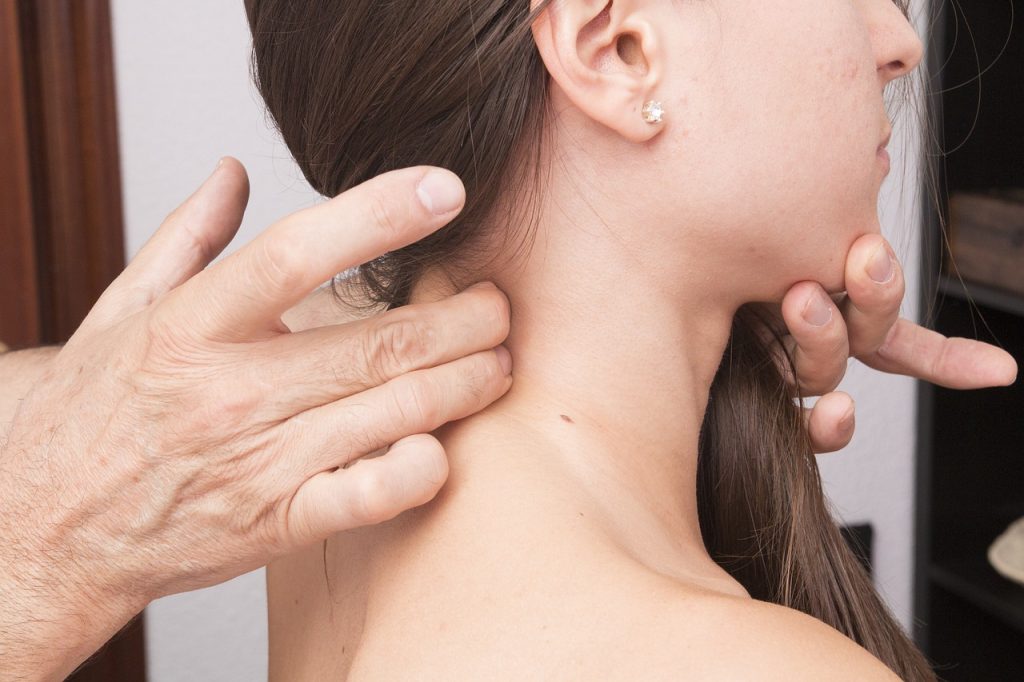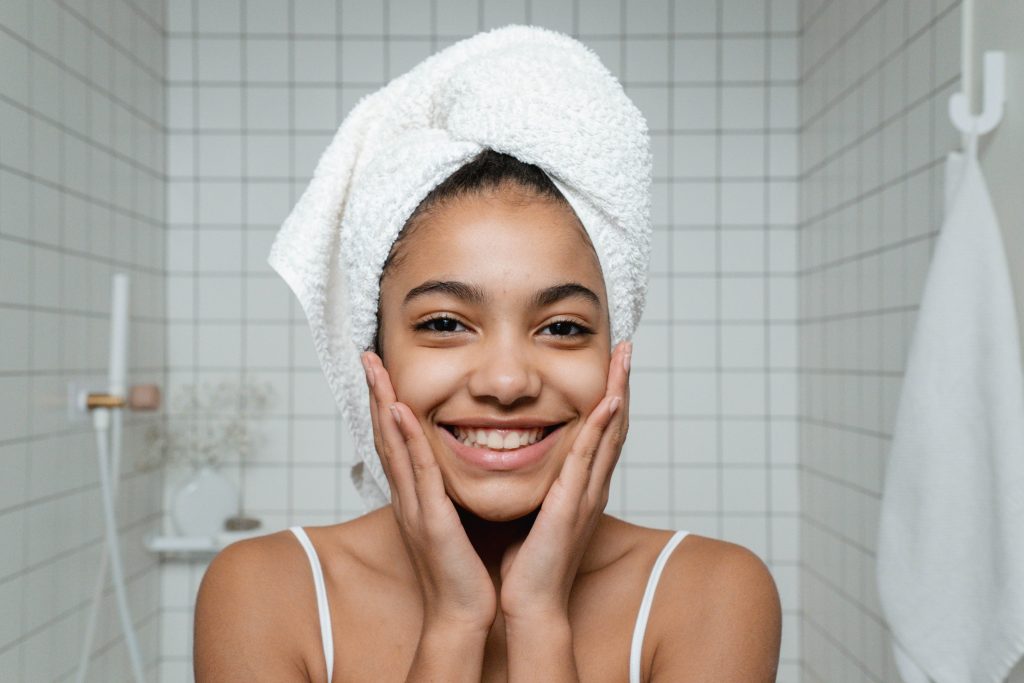Table of Contents
ToggleWhat is Hormonal Acne?
Hormonal acne can be a persistent and frustrating problem for many people, regardless of age. It’s not just a teenage issue; adults often find themselves struggling with breakouts and blemishes well into their 30s, 40s, and beyond.
The good news is that 2024 has brought several innovative and effective treatments that can help you achieve clearer, healthier skin.
In this article, we will explore the top 10 life-changing hormonal acne treatments available this year.
Table of Contents
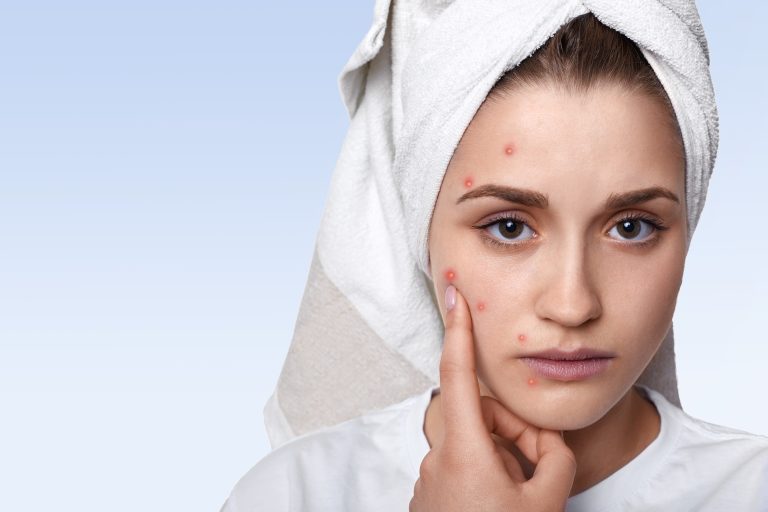
Understanding Hormonal Acne
Before diving into the treatments, it’s essential to understand what hormonal acne is and what causes it. Hormonal acne is primarily driven by fluctuations in hormones, particularly androgens.
These fluctuations can lead to an increase in sebum production, clogged pores, and inflammation. Common triggers include puberty, menstrual cycles, pregnancy, and stress.
Understanding the root cause is crucial in selecting the most effective treatment.
10 Life-Changing Hormonal Acne Treatments in 2024
1. Prescription Oral Contraceptives
Oral contraceptives have been a go-to treatment for hormonal acne for years. They work by regulating hormone levels, particularly androgens, which play a significant role in acne development. Birth control pills like Yaz, Ortho Tri-Cyclen, and others are often prescribed to help manage hormonal fluctuations. These medications can be highly effective, but they are not suitable for everyone, so it’s essential to consult with a healthcare provider.
2. Spironolactone
Spironolactone is a potent anti-androgen medication that has gained popularity for treating hormonal acne. Originally used as a diuretic, it helps reduce the effect of androgens on the skin, decreasing oil production and minimizing breakouts. Many patients have reported significant improvements in their skin condition after starting spironolactone. As with any medication, it’s crucial to discuss potential side effects and suitability with a doctor.
3. Topical Retinoids
Topical retinoids, such as tretinoin and adapalene, are derivatives of vitamin A and are highly effective in treating acne. They work by promoting cell turnover and preventing clogged pores, which are common culprits in acne formation. Retinoids can also help reduce inflammation and improve skin texture. While they can be irritating initially, their long-term benefits make them a staple in acne treatment.
4. Hormonal Therapy with Androgen Blockers
In addition to spironolactone, other androgen blockers like flutamide and cyproterone acetate can be used to manage hormonal acne. These medications work by reducing the effect of androgens on the skin, similar to spironolactone. They can be particularly effective for women who experience severe breakouts related to hormonal imbalances. Always consult a healthcare provider before starting hormonal therapy.
5. Dietary Changes
The role of diet in acne management is increasingly recognized. Certain foods can trigger hormonal fluctuations that exacerbate acne. Reducing sugar intake, avoiding dairy, and incorporating anti-inflammatory foods like leafy greens, fatty fish, and nuts can make a significant difference in skin health. While dietary changes alone may not cure hormonal acne, they can complement other treatments and promote overall wellness.
sum dolor sit amet, consectetur adipiscing elit. Ut elit tellus, luctus nec ullamcorper mattis, pulvinar dapibus leo.
6. Natural Supplements
Several natural supplements have shown promise in managing hormonal acne. For example, zinc, omega-3 fatty acids, and probiotics can help balance hormones and reduce inflammation. Supplements like DIM (diindolylmethane) can also help metabolize estrogen, which can be beneficial for those with estrogen-dominant acne. Always check with a healthcare provider before adding new supplements to your regimen.
7. Laser and Light Therapies
Laser and light therapies are non-invasive treatments that can target acne-causing bacteria, reduce inflammation, and promote skin healing. Blue light therapy is particularly effective for acne treatment, as it targets and destroys the bacteria responsible for acne. Other options include laser resurfacing, which can improve skin texture and reduce acne scars. These treatments often require multiple sessions and can be costly, but they offer promising results.
8. Chemical Peels
Chemical peels involve the application of a chemical solution to the skin, which exfoliates and removes dead skin cells. This process can help unclog pores, reduce inflammation, and improve overall skin texture. Peels containing salicylic acid, glycolic acid, or lactic acid are commonly used to treat acne. Regular chemical peels can significantly reduce breakouts and improve skin appearance.
9. Stress Management Techniques
Stress is a well-known trigger for hormonal imbalances and acne. Implementing stress management techniques such as yoga, meditation, and regular exercise can help regulate hormones and reduce acne flare-ups. Mindfulness practices can also promote overall mental and physical health, making them a valuable part of any acne treatment plan.
10. Customized Skincare Routines
Finally, having a personalized skincare routine tailored to your specific skin type and concerns is crucial for managing hormonal acne. This may include using gentle cleansers, non-comedogenic moisturizers, and targeted treatments like benzoyl peroxide or salicylic acid. Regularly consulting with a dermatologist can help you adjust your routine as needed and ensure you’re using the most effective products.
What Causes of Hormonal Acne?
There are multiple factors that play a role in the development of hormonal acne:
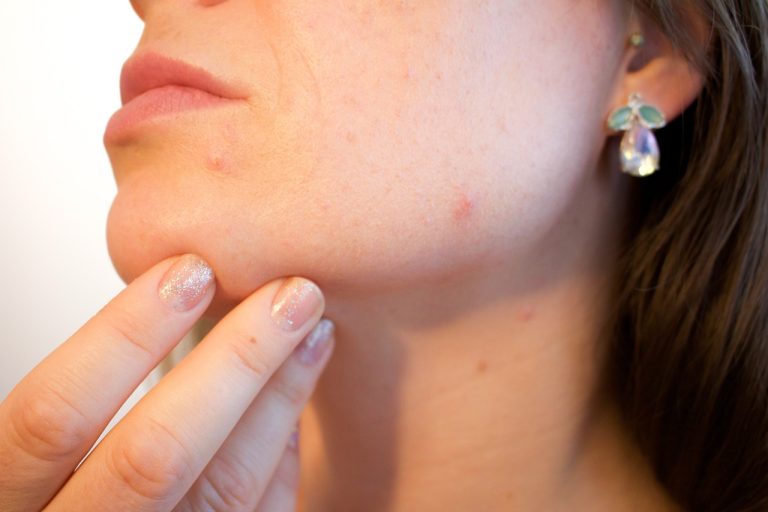
1. Hormonal Fluctuations
The primary cause of hormonal acne is fluctuations in hormone levels, particularly androgens like testosterone. These hormones can increase the production of sebum (oil) in the skin, leading to clogged pores and acne formation
2. Menstrual Cycle
For many women, hormonal acne is closely linked to their menstrual cycle. Fluctuations in estrogen and progesterone levels during the cycle can trigger breakouts, typically occurring in the week leading up to menstruation.
3. Pregnancy
Pregnancy causes significant hormonal changes, which can lead to acne flare-ups. These breakouts may occur at any time during pregnancy but are most common during the first and second trimesters.
4. Polycystic Ovary Syndrome (PCOS)
PCOS is a hormonal disorder that can cause chronic hormonal imbalances. Women with PCOS often experience persistent acne due to elevated androgen levels.
5. Stress
Stress triggers the release of cortisol, a hormone that can worsen acne by increasing inflammation and oil production in the skin.
6. Diet
Certain foods, particularly those with a high glycemic index or high dairy content, can influence hormone levels and contribute to acne.
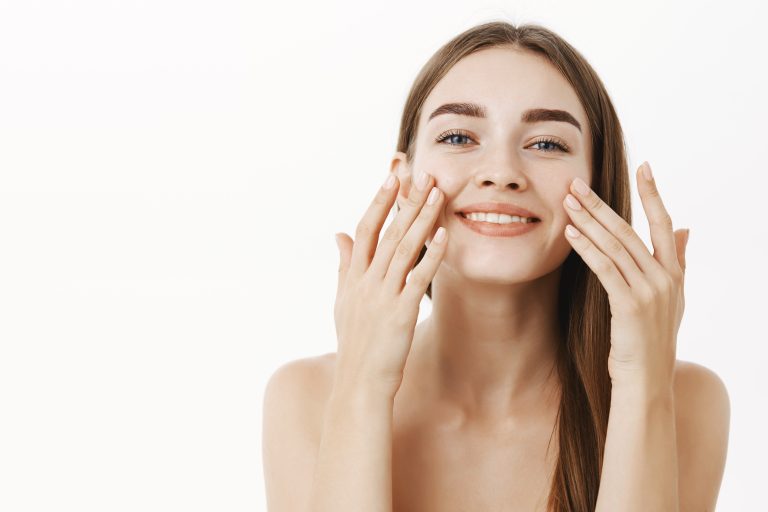
What Treatment for Hormonal Acne?
Treating hormonal acne involves a combination of medical treatments, lifestyle changes, and skincare routines.
Here are some of the most effective treatments:
1. Prescription Medications
Oral Contraceptives: Birth control pills can help regulate hormone levels and reduce androgen production, leading to fewer breakouts.
Spironolactone: This anti-androgen medication reduces oil production and is particularly effective for women with hormonal acne.
Retinoids: Topical retinoids like tretinoin and adapalene promote cell turnover, preventing clogged pores and reducing acne.
2. Over-the-Counter Treatments
Benzoyl Peroxide: This topical treatment kills acne-causing bacteria and helps reduce inflammation.
Salicylic Acid: Salicylic acid exfoliates the skin and unclogs pores, making it an effective treatment for mild to moderate acne.
3. Lifestyle Changes
Dietary Adjustments: Reducing sugar intake, avoiding dairy, and incorporating anti-inflammatory foods can help balance hormones and improve skin health.
Stress Management: Techniques such as yoga, meditation, and regular exercise can reduce stress and help prevent acne flare-ups.
4. Skincare Routine
A customized skincare routine tailored to your skin type and concerns is essential. This may include gentle cleansers, non-comedogenic moisturizers, and targeted treatments like benzoyl peroxide or salicylic acid.
5. Professional Treatments
Laser and Light Therapies: Non-invasive treatments like blue light therapy can target acne-causing bacteria and reduce inflammation.
Chemical Peels: Regular chemical peels with ingredients like salicylic acid or glycolic acid can help unclog pores and improve skin texture.
LEARN : Acne Remedies for Clearing Stubborn acne
Can We Prevent Hormonal Acne?
Yes! Preventing hormonal acne involves maintaining a healthy lifestyle and a consistent skincare routine.
Check out these tips to keep those pesky breakouts at bay!
1. Maintain a Balanced Diet
Eating a balanced diet rich in fruits, vegetables, and whole grains can help regulate hormone levels and reduce the likelihood of acne.
2. Manage Stress
Practicing stress-reduction techniques such as mindfulness, meditation, and exercise can help keep hormone levels stable and prevent acne flare-ups.
3. Consistent Skincare Routine
Use gentle, non-comedogenic products and avoid over-washing or scrubbing your face, as this can irritate the skin and worsen acne.
4. Regular Medical Check-Ups
Regular check-ups with a healthcare provider can help you monitor hormone levels and address any underlying conditions that may contribute to acne.
5. Avoid Harsh Products
Avoid using harsh skincare products or treatments that can irritate the skin and trigger breakouts. Stick to products designed for sensitive or acne-prone skin.
Hormonal Acne: Diet Do’s and Don’ts
Hormonal acne can be influenced by various factors, including diet. Making smart choices in what you eat can play a significant role in managing hormonal acne effectively. Here are some diet do’s and don’ts to help you navigate your way to clearer skin
Diet Do’s:
1. Load Up on Antioxidant-Rich Foods:
“Make sure to include lots of fruits and veggies in your meals! ” These foods are rich in antioxidants, which can help reduce inflammation and promote healthy skin.
2. Opt for Lean Protein Sources:
Do: Choose lean protein sources such as chicken, fish, tofu, and beans. Protein is essential for skin repair and can help keep hormone levels balanced.
3. Include Omega-3 Fatty Acids:
Do: Incorporate foods high in omega-3 fatty acids, such as salmon, walnuts, and flaxseeds. Omega-3s are great because they have properties that can calm down inflammation in your skin and help with acne.
4. Stay Hydrated:
Do: Drink plenty of water throughout the day to keep your skin hydrated and flush out toxins. Proper hydration supports skin health and can help prevent acne breakouts.
5. Choose Complex Carbohydrates:
Do: Opt for complex carbohydrates like whole grains, fruits, and vegetables. These foods have a lower glycemic index, which means they won’t cause blood sugar spikes that can contribute to acne.
6. Consume Probiotic Foods:
Do: Include probiotic-rich foods like yogurt, kefir, and sauerkraut in your diet. Probiotics promote gut health, which can indirectly impact skin health and reduce acne.
Diet Don’ts:
1. Avoid Sugary Foods and Drinks:
Don’t: Limit your intake of sugary foods and beverages like soda, candy, and desserts. High sugar consumption can lead to increased insulin levels, which may trigger acne flare-ups.
2. Minimize Dairy Products:
Don’t: Dairy products, especially milk, have been linked to hormonal acne. Consider reducing your intake of dairy or switching to non-dairy alternatives like almond milk or coconut yogurt.
3. Limit Processed Foods:
Don’t: Processed foods often contain unhealthy fats, sugars, and additives that can worsen acne. Cut back on the processed snacks, fast food, and pre-packaged meals if you can.
4. Cut Back on High-Glycemic Foods:
Don’t: High-glycemic foods like white bread, white rice, and sugary cereals can spike blood sugar levels and contribute to acne. Choose low-glycemic alternatives like whole grains instead.
5.Try to cut down on foods that are high in saturated and trans fats.
Don’t: Limit foods high in saturated and trans fats, such as fried foods, processed meats, and margarine. These fats can increase inflammation in the body and worsen acne.
6. Steer Clear of Excessive Caffeine and Alcohol:
Don’t: Cut back on caffeine and alcohol, as they can dehydrate the skin and disrupt hormone balance. Choose herbal teas and water instead for healthier options.
Learn more about Acne Scar Treatment
Conclusion
By following these diet do’s and don’ts, you can help support your skin from the inside out and reduce the frequency and severity of hormonal acne breakouts. Remember to listen to your body and pay attention to how different foods affect your skin. Making small changes to your diet can lead to significant improvements in your skin health over time.
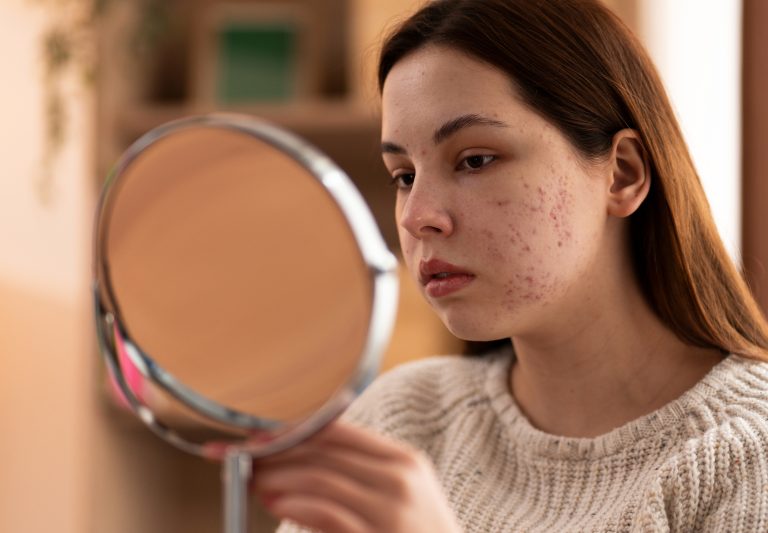
Hormonal Acne: Balancing Medical and Natural Treatment Options
Hormonal acne can be a persistent and frustrating issue, but there are both medical and natural treatment options available to help manage and reduce breakouts.
This guide provides a comprehensive approach to treating hormonal acne by combining effective medical treatments with natural remedies.
Medical Treatment Options
Oral Contraceptives
Birth control pills can regulate hormone levels and reduce the production of androgens. This can help decrease oil production and prevent breakouts. Commonly prescribed birth control pills for acne include those containing both estrogen and progestin.
Spironolactone
Spironolactone is an anti-androgen medication that reduces oil production by blocking androgen receptors. It is particularly effective for women with hormonal acne and can be taken in conjunction with other acne treatments.
Topical Retinoids
Retinoids like tretinoin and adapalene are derivatives of vitamin A. They promote cell turnover, prevent clogged pores, and reduce inflammation. These are available by prescription and are highly effective for treating acne.
Antibiotics
Topical and oral antibiotics can help reduce inflammation and kill acne-causing bacteria. They are typically used for moderate to severe acne and are often combined with other treatments like benzoyl peroxide or retinoids.
Over-the-Counter Treatments
Benzoyl Peroxide: This topical treatment kills acne-causing bacteria and reduces inflammation. It is available in various strengths and can be found in many acne treatment products.
Salicylic Acid: This beta-hydroxy acid exfoliates the skin and unclogs pores. It is effective for treating mild to moderate acne and is commonly found in cleansers, toners, and spot treatments.
Natural Treatment Options
Dietary Adjustments
Reduce Sugar and Dairy: High glycemic foods and dairy products can spike insulin levels and potentially worsen acne. Reducing intake of these foods can help balance hormones
Anti-Inflammatory Foods
Incorporate foods rich in omega-3 fatty acids, such as salmon, walnuts, and flaxseeds and improve skin health.
These foods can help reduce inflammation and promote clearer skin.
Herbal Supplements
Zinc: Zinc supplements have anti-inflammatory properties and can help reduce acne severity. Zinc also supports immune function and skin healing.
Vitex (Chasteberry): This herbal supplement is believed to balance hormone levels and is often used to treat menstrual-related acne. Always consult with a healthcare provider before starting any new supplement.
Skincare Routine
Gentle Cleansers: Use a sulfate-free cleanser to avoid stripping the skin of natural oils. Over-cleansing can lead to increased oil production and worsen acne.
Non-Comedogenic Products: Ensure that all skincare and makeup products are labeled non-comedogenic, meaning they won’t clog pores.
Natural Exfoliants: Instead of physical scrubs, opt for gentle chemical exfoliants like lactic acid or fruit enzymes to remove dead skin cells without irritation.
Stress Management
Mindfulness and Meditation: Practices like mindfulness, meditation, and deep-breathing exercises can help manage stress levels, which can impact hormone levels and acne.
Regular Exercise: Exercise not only helps reduce stress but also improves circulation, which can benefit overall skin health. Aim for at least 30 minutes of exercise most days of the week.
Hydration and Sleep
Stay Hydrated: Drinking plenty of water throughout the day can help keep your skin hydrated and support overall health.
Quality Sleep: Aim for 7-9 hours of quality sleep each night. Poor sleep can disrupt hormone levels and exacerbate acne.
Professional Treatments
Laser and Light Therapy
Blue Light Therapy: This non-invasive treatment targets acne-causing bacteria and reduces inflammation. It can be an effective adjunct to other acne treatments.
Chemical Peels
Salicylic and Glycolic Acid Peels: Regular chemical peels can help unclog pores, reduce acne, and improve skin texture. Consult with a dermatologist to determine the best type and frequency for your skin.
Conclusion
- Balancing medical and natural treatment options for hormonal acne provides a holistic approach to managing this challenging condition.
- By combining prescription medications with dietary changes, stress management, and a tailored skincare routine, you can achieve clearer skin.
- Consult with healthcare professionals to tailor treatments to your specific needs and maintain a consistent routine for the best results.
- With persistence and the right combination of treatments, you can effectively manage hormonal acne and enjoy healthier, clearer skin.


